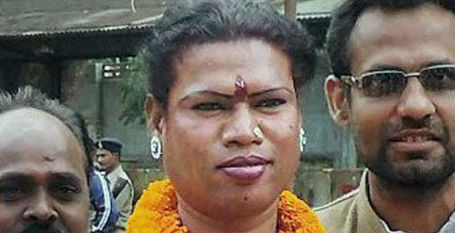Madhu Kinnar, 35, won the election of the Raigarh Municipal Corporation in the central Indian state of Chhattisgarh Jan 4. Madhu, an independent candidate won by a margin of 4,500 votes defeating her closest rival from the ruling federal and state ruled Bharatiya Janata Party.
Her wins comes after the Indian Supreme Court ruled last April that transgender people be recognized as the third sex, be accorded social acceptability and an equal standing under Indian law.
Before that ruling transgender people were not part of the welfare, economic, cultural or political decision process that every Indian should be part of. They were even barred from receiving driver licenses, national tax system registration and ration cards.
"People have shown faith in me. I consider this win as love and blessings of people for me. I'll put in my best efforts to accomplish their dreams," Madhu said after winning the election, according to ndtv.com.
"I only spent 60,000-70,000 rupees (about US$950-1,100) from my earnings during my campaign. It was the public support that encouraged me to enter the poll fray for the first time and because of their support only, I emerged as the winner," Madhu was quoted as saying.
Madhu comes from the Dalit community, the lowest rung on India’s four tier caste system and who were formerly described as untouchable.
Mayors in India wield local clout in towns and cities because they can make decisions on local issues and have power over municipal funds.
Madhu is a school dropout and had previously made a living begging on trains. She had no previous experience of running for mayoral office.
In modern day India transgender women are reviled, harassed and marginalized, largely reduced to making a livelihood begging and dancing during weddings and at street corners.
This was despite the fact that transgender people known as “hijras” have a recorded history of more than 4,000 years in India and were once a firmly accepted group in Indian culture. That status changed in the British colonial period and they were since legally marginalized with limited access to healthcare, employment or education.
Conservative estimates place India’s third gender to be at least six million adults.

